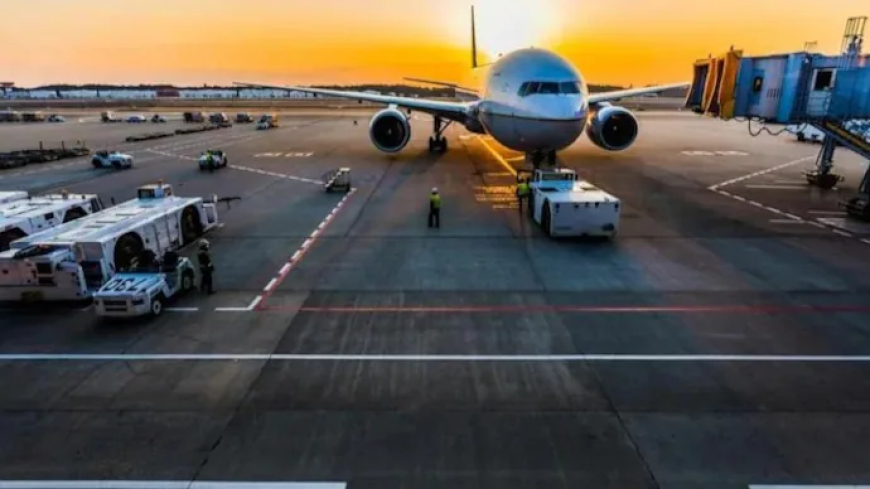Turkey’s Celebi Aviation Sues India Over Security Clearance Revocation Amid Pakistan Tensions
Celebi Aviation files legal action against India for revoking its security clearance, citing diplomatic tensions involving Pakistan. The case unfolds amid rising Indo-Turkish geopolitical frictions.

Turkey’s Celebi Aviation Sues India Over Revoked Security Clearance Amid Pakistan
Tensions
Introduction
In a dramatic escalation of diplomatic friction and commercial disruption, Turkey-based Çelebi Aviation Holding, a key player in ground handling operations at Indian airports, has filed a legal challenge against the Indian government. The move comes after the Ministry of Home Affairs revoked Celebi’s security clearance — a requirement for operating at sensitive locations like major Indian airports.
The revocation follows increasing tensions between India and Pakistan, with Turkey’s growing closeness to Islamabad casting a shadow over Turkish firms operating in India. This incident is not only a reflection of deteriorating Indo-Turkish relations but also signals a shift in India’s approach to national security when foreign entities are perceived as indirectly aligned with adversarial states.
Background: Who Is Celebi Aviation?
Celebi Aviation is a Turkish conglomerate offering aviation ground services across major airports globally. In India, it has operated since 2009, providing services at Delhi’s Indira Gandhi International Airport, Mumbai’s Chhatrapati Shivaji Maharaj International Airport, Bengaluru’s Kempegowda International Airport, and others.
Celebi's Indian arm had successfully become a notable force in the ground-handling sector, known for efficiency and safety standards. The company was even in discussions for expanding to other Indian airports when the abrupt revocation of security clearance halted all forward momentum.
Security Clearance: What It Means and Why It Matters
Security clearance is mandatory for aviation companies in India to access sensitive airport areas and maintain compliance with the Bureau of Civil Aviation Security (BCAS). Without it, Celebi cannot conduct operations such as baggage handling, aircraft loading, and refueling.
The Ministry of Home Affairs cited "national security concerns" behind the withdrawal. While no detailed explanation has been made public, officials hinted at Celebi’s ultimate ownership, management roots in Turkey, and Ankara’s outspoken support for Pakistan on the Kashmir issue as the primary red flags.
The Legal Challenge: Celebi’s Delhi High Court Move
In response, Celebi Aviation India has moved the Delhi High Court challenging the decision, stating it was arbitrary and lacked due process. The company’s legal counsel argues that the clearance revocation was not preceded by any formal inquiry or hearing, violating principles of natural justice.
The petition urges the court to suspend the Home Ministry’s order and direct the government to restore the clearance until the matter is fully adjudicated. A single-judge bench is currently hearing the matter and has issued notices to the Ministry of Civil Aviation and the Ministry of Home Affairs, seeking their response within three weeks.
Celebi’s Argument in Court: “Political Fallout, Not Legal Justification”
Celebi’s core argument rests on the idea that it has functioned transparently in India for over a decade, fully complying with all regulatory frameworks. The company believes it is being unfairly targeted due to the political dynamics between India, Turkey, and Pakistan — rather than any factual lapses in security compliance.
A senior lawyer for Celebi commented, “This action effectively sabotages our operations in India without any credible or proven allegation. It is a diplomatic fallout being misrepresented as a national security matter.”
India’s Diplomatic Stance: Hardening Lines with Ankara
Turkey’s increasing support for Pakistan — especially on the Kashmir issue — has drawn ire from New Delhi. Turkish President Recep Tayyip Erdoğan has frequently echoed Pakistani narratives on Kashmir at global forums, including the United Nations.
India has responded diplomatically by curbing trade, delaying visa approvals for Turkish nationals, and now, seemingly, by tightening scrutiny over Turkish businesses operating on Indian soil.
In 2023, India had already blocked some Turkish defense companies from participating in tenders. The Celebi case now opens a new front, suggesting that even civil aviation players are not immune from the geopolitical crossfire.
Aviation Sector Ramifications: Who Fills the Void?
The sudden revocation of security clearance to Celebi creates an operational vacuum at airports where the firm handled over 35% of ground services. The Airports Authority of India (AAI) and private airport operators are now scrambling to ensure continuity of services.
Other players such as AISATS (Air India SATS) and BWFS (Bird Worldwide Flight Services) are being looked at to fill the gap. However, a sudden replacement on such a scale raises concerns about service disruptions, labor issues, and potential compromises in safety or efficiency.
Industry insiders are also worried about investor sentiment. Foreign aviation companies may view this as a precedent for abrupt policy decisions in India, especially when political winds shift.
India’s Justification: National Security or Strategic Targeting?
While India has the sovereign right to revoke security clearances based on intelligence inputs, questions remain about the timing and procedural fairness of this particular case. Critics argue that Celebi has been penalized without a transparent process, setting a worrying precedent for foreign investors.
However, government sources maintain that the decision is part of a broader “strategic autonomy” push, where India is asserting its national interest in all sectors, especially when foreign players have links — directly or indirectly — to unfriendly states.
A senior official stated off record, “This isn’t about Turkey per se. It’s about the company’s indirect alignment with a hostile narrative and ecosystem. National security doesn’t wait for legalities when a red flag is raised.”
International Backlash? Turkish Government’s Possible Response
The Turkish government has yet to officially comment, but sources in Ankara indicate that the Erdogan administration is monitoring the situation closely. Given Turkey’s growing economic ambitions in South Asia, India’s move may prompt retaliatory steps, especially against Indian businesses operating in Turkey.
The incident could also affect broader trade agreements between the two nations, further complicating an already frosty diplomatic climate.
What’s Next: Legal Outcome and Political Calculus
The outcome of Celebi’s petition in the Delhi High Court will be watched closely. If the court rules in Celebi’s favor, it could lead to a diplomatic stand-off. If the court sides with the government, Celebi’s exit from India may become inevitable, setting an example for other foreign firms with geopolitical baggage.
From a policy standpoint, the Indian government is expected to continue its "India First" doctrine, where security and geopolitical considerations will outweigh commercial interests, especially in sensitive sectors.
A New Chapter in India's Commercial Nationalism
The Celebi Aviation case is more than just a legal dispute over paperwork — it is a reflection of a broader trend where geopolitical posturing influences economic decisions. India, balancing its commercial openness with a newfound assertiveness on foreign policy, is clearly recalibrating its thresholds.
As geopolitical tensions with Pakistan persist and Turkey remains an active voice in anti-India narratives, firms from such nations may find India a tougher, more scrutinized place to operate. Celebi’s lawsuit will not only test the legal resilience of India’s institutional processes but also act as a litmus test for how India balances law, commerce, and security in a multipolar world.
What's Your Reaction?
 Like
0
Like
0
 Dislike
0
Dislike
0
 Love
0
Love
0
 Funny
0
Funny
0
 Angry
0
Angry
0
 Sad
0
Sad
0
 Wow
0
Wow
0












































































